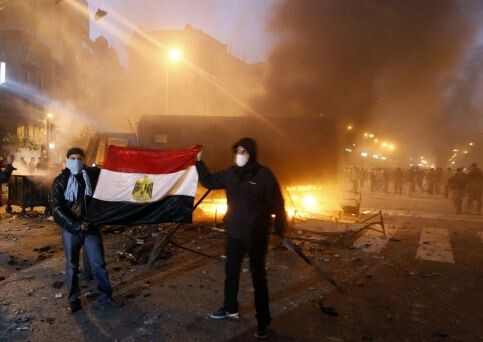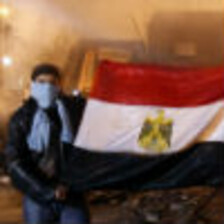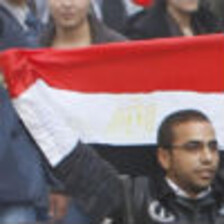The Electronic Intifada 28 January 2011

Protesters in Cairo have defied curfew as the “Day of Rage” burns on. (Mohammed Abed/AFP)
CAIRO (IPS) - Tear gas and smoke wafted through the air of the Egyptian capital on Friday as police moved swiftly to disperse anti-government demonstrations throughout the city.
“The police are using unprecedented brutality against the protesters, which include women and children,” says Ghada Shahbender, board member of the Egyptian Organization of Human Rights (EOHR).
The government cut all Internet service and mobile lines in Egypt ahead of Friday’s demonstrations, which marked the fourth consecutive day of “Day of Anger” anti-government protests. The communications blackout appears aimed at suppressing protesters from using social networking sites to coordinate their activities or report on clashes with police.
President Hosni Mubarak showed little signs of stepping down after thirty years of rule. Thousands of black-clad riot police occupied major streets, bridges and squares throughout the capital. The army has not yet been deployed.
“The army will be the government’s last resort,” says protestor Mohamed Abdel Moneim. “When we see the army we will know that the Pharaoh [Mubarak] is almost finished.”
Riot police intercepted one demonstration march that begin near a large mosque in Cairo’s Mohandifeem district, firing tear gas into a crowd of about 3,000 people.
“Suddenly they blasted us with so much tear gas that we were suffocated,” said Shahbender, who observed the violence.
The riot police used “unprecedented brutality” to suppress the demonstration, indiscriminately beating up protesters and bystanders with batons, pipes and iron rods.
“After they started beating us, they cordoned us off to prevent injured people from getting medical care,” she said.
EOHR chairman Hafez Abou Seada says the nationwide communications embargo has prevented activists from coordinating their efforts, and restricted media coverage of the protests.
“The government made the three mobile phone companies cut their lines this morning, the Internet has been blocked since last night,” he told IPS.
“Police have detained journalists and some satellite broadcasts have been blocked.”
EOHR reported three persons were killed by police Friday, bringing to seven the number of deaths since the protests began on 25 January. Hundreds more have been wounded, and at least 1,200 protesters have been arrested.
“There are ongoing battles between demonstrators and police in different areas of Cairo as in other parts of the country,” says Abu Seada. “But in some areas the police are not obeying orders to shoot the demonstrators [with rubber bullets].”
Activists first declared 25 January a “Day of Anger” on Facebook and Twitter, and used the social networking sites to garner support. More than 80,000 people joined a Facebook group saying they would participate in the protests.
Hundreds of thousands of Egyptians have taken to the streets during the four days of protests, which marked the biggest grassroots uprising since Mubarak took power in 1981. Disparate Egyptians have been inspired and unified by the fall of former Tunisian president Zine El Abidine Ben Ali who was toppled two weeks ago after weeks of escalating street protests.
“Ben Ali fell, now it’s your turn Mubarak,” one group of protesters chanted.
As evening fell on Friday, an eerie silence hung over some parts of the capital. Smoke filled the darkened streets and gunshots rang out in the distance. Demonstrators promised to continue their protests throughout the night, defying a curfew.
All rights reserved, IPS — Inter Press Service (2011). Total or partial publication, retransmission or sale forbidden.
Related Links





